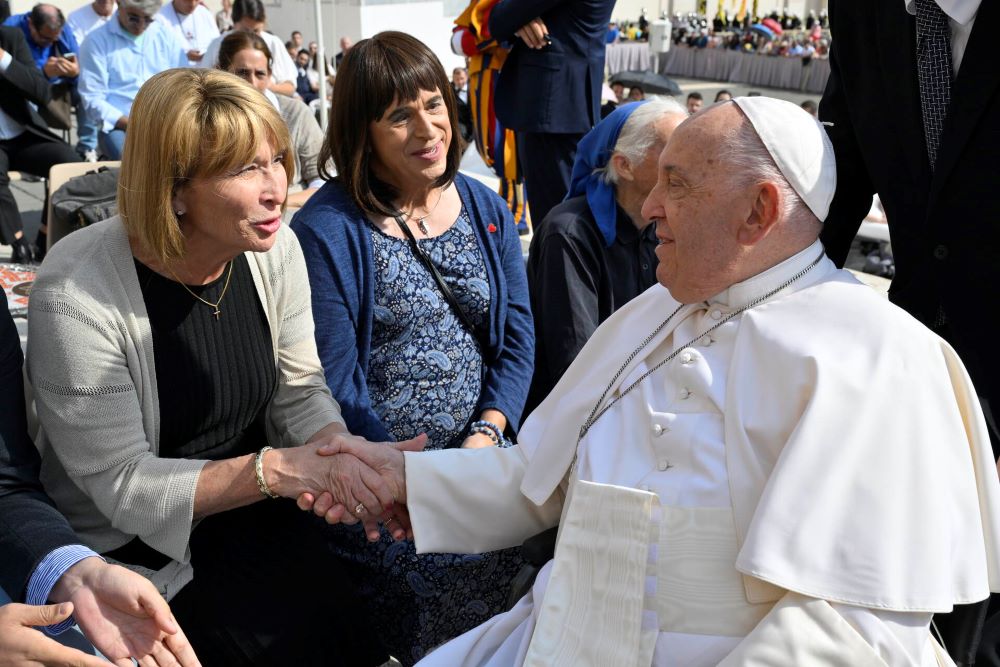
Maureen Rasmussen, left, and Martha Marvel meet Pope Francis in St. Peter’s Square at the Vatican on Sept. 18. They were among four American Catholic trans women who sent the pope a letter describing their lives as Catholics and transgender people before meeting him. (Vatican Media)
Before meeting Pope John Paul II 24 years ago, Mark Mogilka panicked.
As he walked up the steps to greet the pope, he thought about the secret he had never shared with anyone but his wife — that he was a transgender/dual gender person.
"I remember being in just total panic, because I have a perception of the Holy Father as a person filled with the Holy Spirit who can see people's hearts," he said, recalling that day. "I had this nightmare that when I reached out to shake his hand, he was going to pull it back, because he saw what was in my heart, that I was a transgender person, and not really living a true, full Catholic life."
At that point in his life, Mogilka was at the peak of his 40-year career in family, parish and pastoral ministry for the Diocese of Green Bay, Wisconsin, and had served another nine years in top leadership positions in the La Crosse, Wisconsin, and Columbus, Ohio, dioceses.
After spending more than 10 years among the top experts in the U.S. in advising about Catholic pastoral guidelines for how to best link, merge, cluster and close parishes, Mogilka in 2017 received the Louis J. Luzbetak, SVD Award, presented annually by the Center for Applied Research in the Apostolate at Georgetown University, "for exemplary applied church research and service to the Church."
He thought then that it was a good time to retire and finally live as a transgender/dual gender person, which he had repressed for nearly 60 years, and identify as Martha Marvel.
'A visit to the pope, just this whole thing happening, convinces me I'm on the right path.'
—Lynn Discenza
Seven years later, Marvel and three other American Catholic transgender women briefly met Pope Francis. On Sept. 18, each woman shook his hand and received a blessing after introducing themselves as "four trans women who have always lived and worked in the Catholic Church."
Before proceeding in his wheelchair to meet and bless other attendees, Francis told them twice, "Pray for me." Meeting the pope this time, Marvel said, she felt "at peace with my relationship with my God."
"The pope represents God, the Holy Spirit, and I felt like we were on the same wavelength. There was nothing to be afraid of. And it was wonderful," she told the National Catholic Reporter.
Marvel, Maureen Rasmussen, Christine Zuba and Lynn Discenza first learned that they would be able to meet the pope in September when they attended the August 2024 LGBTQ+ Ministry Outreach Conference. There they met Fr. Andrea Conocchia, an Italian priest from the Church of the Immaculate Blessed Virgin, a suburban parish in Torvaianica, a small town outside Rome. The priest has been regularly taking transgender sex workers to public audiences and lunches with the pope since 2020.
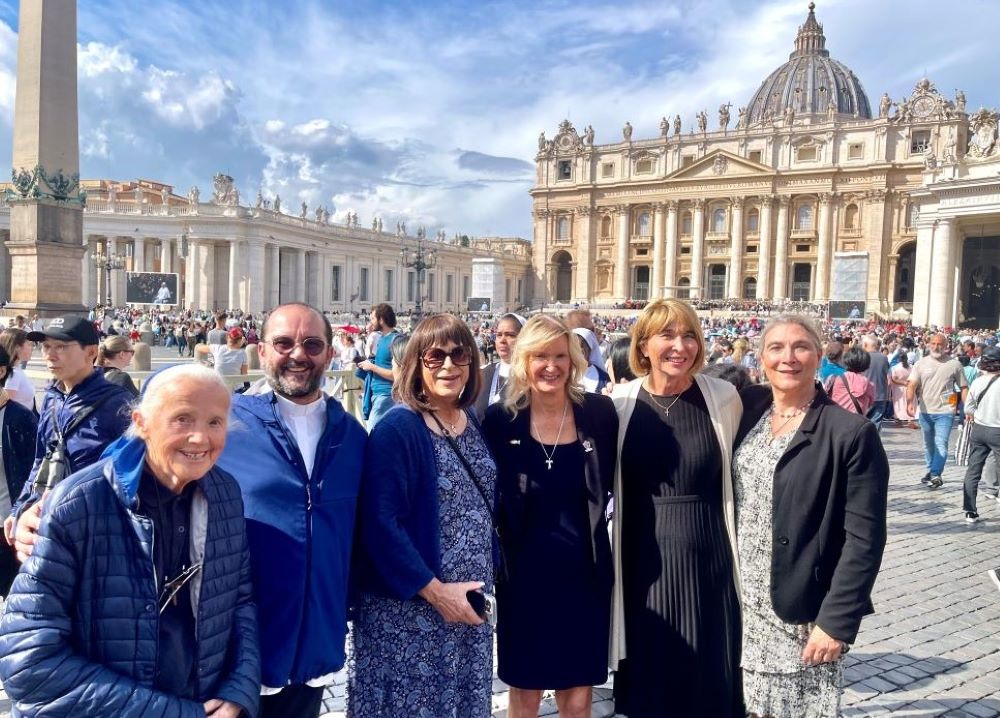
Martha Marvel (third from left), Christine Zuba, Maureen Rasmussen and Lynn Discenza pose in St. Peter's Square at the Vatican with Fr. Andrea Conocchia and Sr. Geneviève Jeanningros, on Sept. 18. Conocchio coordinated the women's meeting with the pope, and Jenningros has coordinated similar meetings. (Camillo Barone)
At the height of the COVID-19 pandemic in Italy, a group of transgender sex workers asked Conocchia for help getting food after days of starvation. Conocchia opened the doors of his parish to them, but when he realized that he did not have enough resources to help them, he wrote a letter to the pope. A few hours later, the pope let him know that he would send help.
From that day on, the trans sex workers of Torvaianica wrote thank you letters to the pope that also highlighted their sufferings and their life stories. In response, the pope invited them several times to the Vatican for lunches and audiences.
On July 6, a trans sex worker from Conocchia's community, known as Lilli, was found dead in a pine forest near the beach in Torvaianica. Conocchia said her death shocked the trans community there. Just last year, Lilli had met the pope at the Vatican with a group of trans sex workers.
When Marvel, Rasmussen, Zuba and Discenza attended the 2024 Outreach Conference, they thanked Conocchia for his work and advocacy and he came up with the idea of inviting them to an audience with Francis. At first the women hesitated but then they accepted, thinking that this opportunity might be an important sign to the American Catholic LGBTQ+ community.
Two days before meeting with the pope, the women visited Conocchia in Torvaianica, where they met some of the sex workers he supported, prayed the rosary in his parish and made a donation to support the priest's pastoral work.
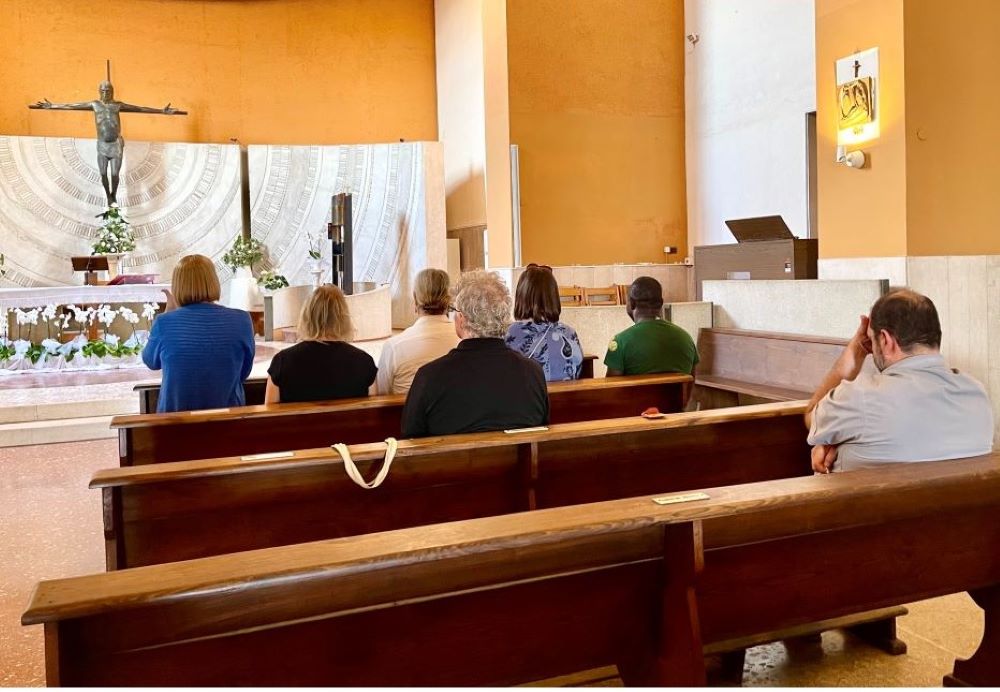
Maureen Rasmussen, Christine Zuba, Lynn Discenza and Martha Marvel pray the rosary with Fr. Andrea Conocchia in his parish in Torvaianica, a town outside Rome, on Sept. 16. (Camillo Barone)
The four women came out to their families and friends as transgender women in their 60s when they began their respective transition journeys. They are all lifelong practicing Catholics and they said in interviews with NCR that their identities as Catholics and trans people are inseparable. Today, they are active in LGBTQ+ ministries in Wisconsin, Maryland, New Jersey and Connecticut.
Despite her career achievements in multiple dioceses, Marvel grappled with complex feelings regarding her identity. Growing up with three sisters, she often found herself drawn to wearing their clothing, yet lacked the language or guidance to understand her feelings, she said. It wasn't until college that she discovered the term "cross-dresser," which offered her some clarity, although she initially sought a "cure" for what she perceived as a troubling obsession. Marvel, who described herself as a "workaholic," immersed herself in work-related activities to avoid confronting her feelings.
As time passed, Marvel recognized the need for honesty in her marriage. After 13 years, she decided to reveal her transgender identity to her wife after a Halloween party where she dressed as a bearded woman. The conversation that followed was challenging; although she provided her wife with resources to understand, it took her nine months to process it. Throughout this period, Marvel found herself navigating a delicate balance between living as Martha and maintaining family and Catholic-leadership life as Mark.
"I was going through a big marriage crisis. Somebody once asked me how I survived so long in diocesan ministry and work. I put in 60 hours a week. Part of it is I would always have an Ignatian process, every year, that I would look back over the previous year, and if I could tell myself that I was making a difference in people's lives and making the church better, that then I knew that God was at the base of this, and I could continue," she said.
"It was just a strange time, and even today, I do not live full time as Martha," she continued. "I live a dual-gendered life, and it's a question of balance between the feminine energy and my male energy, and if I spend too much time as Martha, my heart longs for time as Mark, and if I have too much time that Martha hasn't been able to be present fully and out and about and socializing with others, I can feel the tug on my heart, on my spirit."
'The pope represents God, the Holy Spirit, and I felt like we were on the same wavelength. There was nothing to be afraid of. And it was wonderful.'
—Martha Marvel
Since her retirement, Marvel has helped establish support networks for transgender individuals. In 2017, she founded the TG/CD 1st Thursday Gathering, a monthly support group held in Green Bay's Napalese Lounge. The group, which averages 25 attendees, has connected with more than 300 transgender people and offers special events for spouses and partners. Additionally, in 2022, Marvel initiated the Bay Area Trans Youth Alliance (BATYA), which provides a safe space for trans youth, attracting 20 to 25 participants monthly.
Her activism has also included significant public speaking engagements and participation in educational programs. In 2023, Marvel organized the first annual queer prom for LGBTQ+ high school students in the Green Bay area, drawing 80 attendees. She has spoken at various institutions, including St. Norbert College and Northeast Wisconsin Technical College, on topics related to LGBTQ+ inclusion and support.
Despite the challenges she faced in reconciling her gender identity with her Catholic work and life, Marvel said she continues to seek a positive relationship with her faith. Today, she remains married with four grown children and 11 grandchildren.
From a young age, Maureen Rasmussen, too, felt a profound dissonance between her body and mind. "I was probably 3 or 4, not any older than that," she recalled, describing vivid dreams of being a girl and sneaking into her mother's clothes hamper for items to wear. It was a confusing experience, especially when she was caught at age 10 with her sister's skirt hidden under her pants. "I was terrified. I didn't know what I was doing; I didn't know how to unpack it," she said.
Her career path led her to a senior marketing position at General Electric, after which she acquired a lighting company in Maryland, where, as past president and CEO, she still serves as strategic adviser. While she thrived in her professional life, the internal struggle continued to weigh heavily on her. The thought of buying women's clothing filled her with dread as did the idea of being discovered for who she really was.
"I was scared to death," she said.
Rasmussen eventually married a woman in 1995. The turning point in the relationship with her wife came during Easter vigil in 2013, when Rasmussen returned home to find her spouse unable to feel her legs — a sign of the alcoholism-related neuropathy that had begun to take hold.
She had been drinking heavily and suffered a series of falls and blackouts, prompting Rasmussen to attempt multiple interventions that ultimately failed. Over the following years, Rasmussen's wife's health deteriorated dramatically, and she died in July 2024.
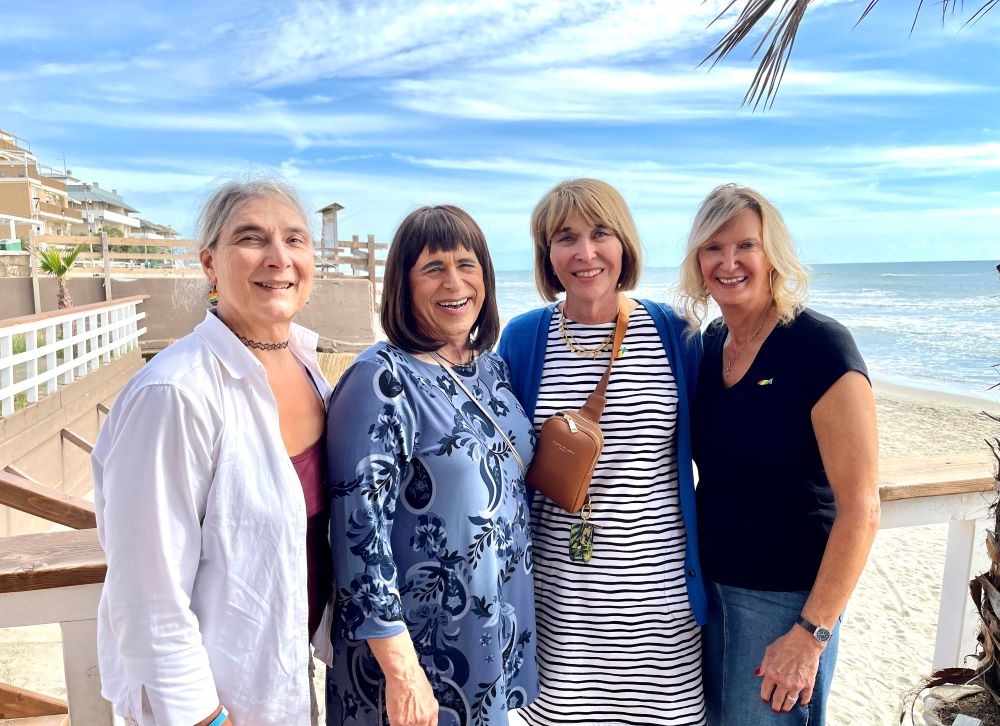
Lynn Discenza, Martha Marvel, Maureen Rasmussen and Christine Zuba pose during a break in Torvaianica, a town outside Rome, during their visit to Fr. Andrea Conocchia's parish on Sept. 16. (Camillo Barone)
At the same time, during those tragic years, Rasmussen's fight with her gender dysphoria began unfolding. In an interview with NCR, she recalled returning from a business trip to Key West, Florida, in early 2015, when her life took a dramatic turn. For years, Rasmussen had been secretly expressing her true self, Maureen, during business trips, taking extra days to dress according to her gender identity and explore her identity. She began experiencing intense physical symptoms: unbearable chest pain, sleepless nights and extreme weight loss.
Although she underwent a battery of medical tests, doctors found no physical cause. During this time, Rasmussen had a life-changing realization, through the help of a therapist. If the source of her suffering wasn't physical, perhaps it was deeply tied to her suppressed gender dysphoria.
Advertisement
Throughout her transition journey, Rasmussen said, her Catholic faith remained a central pillar. She recalled the support priests provided during her recovery from her gender-affirming surgeries at a San Francisco hospital — particularly the moment a Jesuit priest came to her room, anointed her, listened to her story and gave her Communion.
"The Eucharist is the center of my life," she said. "I was so much at peace with my faith and the person I always knew I was. There was just this incredible joy, and that light still burns today, a sense of joy that I don't know if I've ever felt before. I don't think that's ever going to go away. It's like I made it, I finally made the connection, and God is right here with me."
On Sept. 16, two days before meeting Pope Francis, after saying goodbye to Conocchia outside his parish, Discenza whispered to Rasmussen, "Maureen, can you believe that this is really happening?" "Yes," Rasmussen said, "And it feels like heaven."
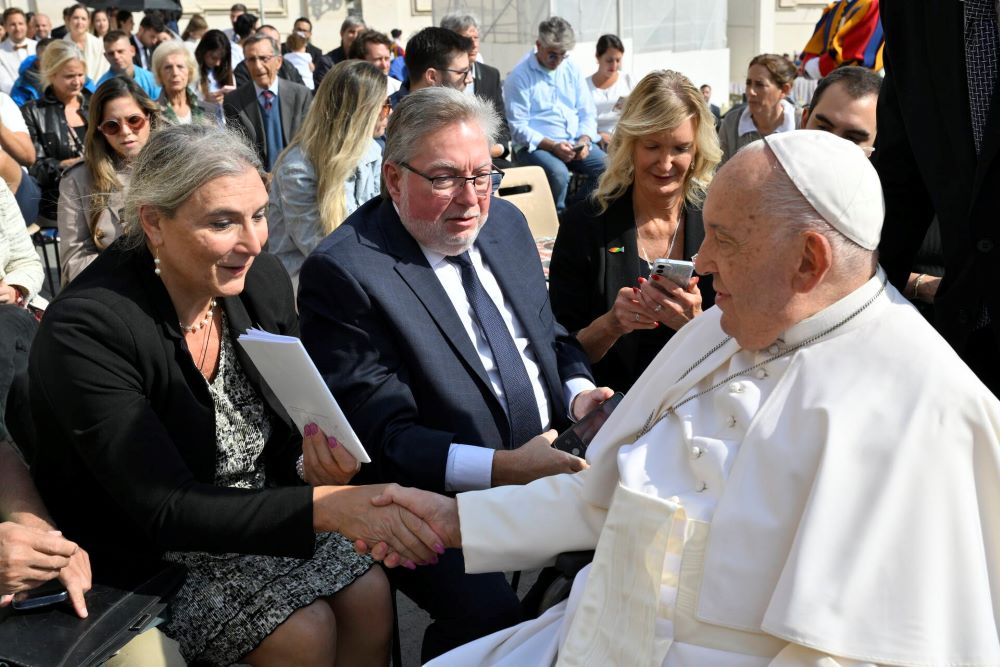
Lynn Discenza gives Pope Francis a book containing a collection of life stories written by LGBTQ+ Catholics and parents of LGBTQ+ kids from her parish, St. Patrick-St. Anthony in Hartford, Connecticut, during her meeting at St. Peter's Square at the Vatican on Sept. 18. (Vatican Media)
When Discenza met Pope Francis, she gave him a book containing a collection of life stories written by LGBTQ+ Catholics and parents of LGBTQ+ kids from her parish, St. Patrick-St. Anthony in Hartford, Connecticut. As a retired engineer and LGBTQ+ advocate for more than 10 years, Discenza has dedicated herself to supporting the queer Catholic community, establishing support groups and serving as a speaker to promote understanding and acceptance.
In a joint personal letter the four women delivered to the pope through Conocchia prior to their meeting, Discenza traced her entire life as a Catholic, recounting how she spent more than a year in an Augustinian seminary when she was 19, her marriage and subsequent divorce, and her transition journey.
"It is my belief that God created me just as I am and God's will for me is to be my authentic self, to live out the call to be the best version of myself. Not to hide myself, my gifts under a bushel basket. But to instead witness to others, especially to Catholics, that as a transgender woman, I am created in the image of God and loved by God for who God made me to be," she wrote.
Discenza told NCR that in the "most painful" period of her life, namely when her wife divorced her and she could no longer ignore the need to affirm her gender identity, she had suicidal thoughts. However, a long spiritual journey reading Jurgen Moltmann's The Crucified God helped her survive, she said.
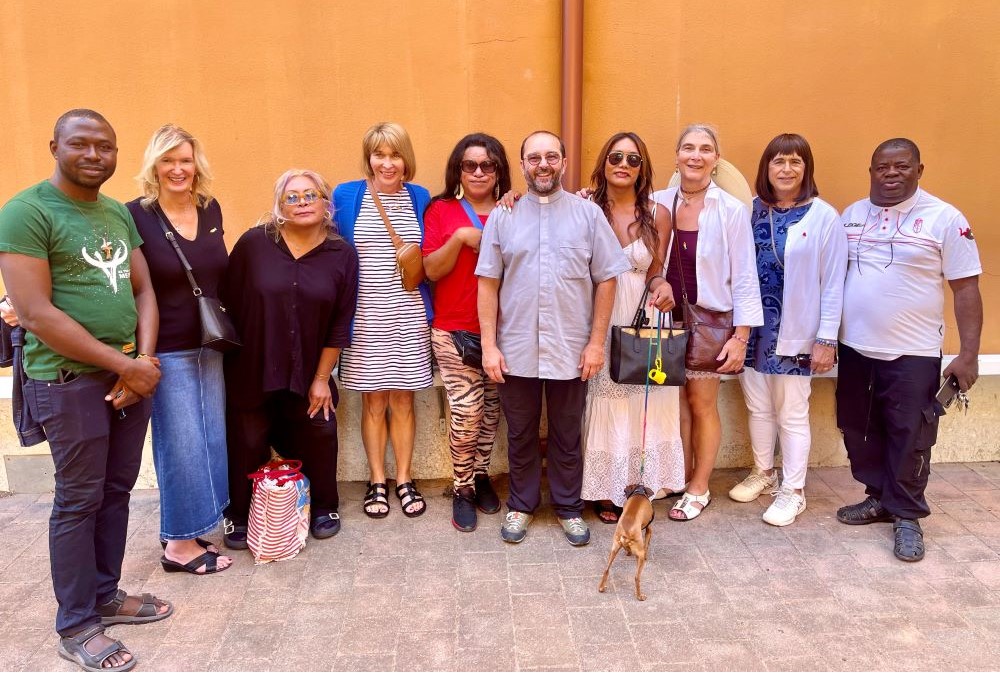
Christine Zuba, Maureen Rasmussen, Lynn Discenza and Martha Marvel meet Sept. 16 with some of the transgender sex workers Fr. Andrea Conocchia ministers to at the Church of the Immaculate Blessed Virgin in Torvaianica, a town outside Rome. (Camillo Barone)
"People always ask me, 'Why do you stay in the Catholic Church?' My conscience says that it's good that I'm close to God. There's no reason to shy away. I think of myself just like prophets. I'm willing to take criticism, and in the LGBTQ+ community I get a lot of criticism for being in the Catholic Church. For some reason, it just feels right for me, and I pray that I can continue to be myself," she said.
"A visit to the pope, just this whole thing happening, convinces me I'm on the right path."
In their letter to the pope, Christine Zuba, the fourth Catholic transgender woman in the group, mentioned the impact of the ministry of Sr. Luisa Derouen, an Dominican Sister of Peace who has advocated for greater inclusion of trans people in the Catholic Church for the past 25 years, bringing many trans Catholics back to the church.
After Francis blessed Zuba, she asked if he could autograph his recent autobiographical book, Life, explaining that she would give it to Derouen.
She told NCR she felt blessed to have been invited to meet the pope and called the entire day "an absolutely wonderful experience." But she also expressed some disappointment that none of the attendees had the opportunity to ask Pope Francis a direct question. "I think trying to get him to say something even a little bit positive about transgender persons would have been a big step," she reflected.
Zuba, a retired electrical engineer from New Jersey, said her faith "blossomed" after her transition. She described feeling "reborn" and spiritually enriched, particularly when hearing positive messages about LGBTQ+ people from religious leaders. "Our church has changed over history. We know that, and it will continue to evolve, perhaps not change, but evolve, all for the better," she said. "I pray that Pope Francis can understand that as transgender people, we too have no choice in the matter that we are who God made us to be."








